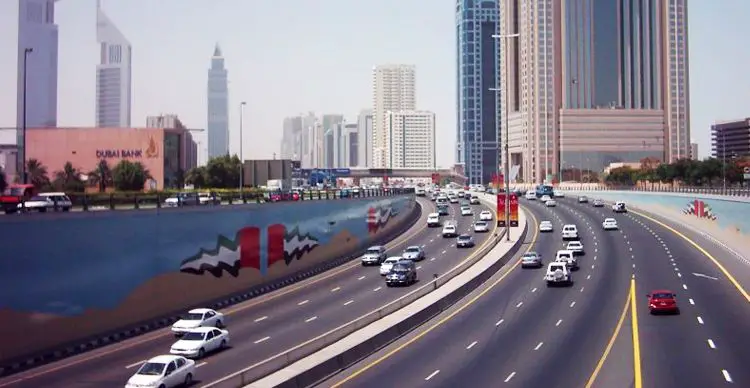Following these few simple tips and guidelines when driving on Dubai roads, may help you in handling Dubai traffic in a better manner. Here are some basic Do's and Don'ts to be followed:

Do's
- You need to be at least 18 years of age to drive legally in Dubai.
- Renew your driving license every 10 years after age 21, as prior to this, you may have to re-apply for your license annually.
- It is a known fact that seat belt is the most important safety aspect not only in the roads of Dubai, but anywhere in the world, as there may always be situations requiring sudden breaks or halts.
- When you are driving in Dubai roads for the first time, try driving on Friday mornings, as being a holiday, the roads are rather empty. Also, you may start off with the quieter roads until you build confidence, and then go on the busier roads. Beach Road and Al Wasl Road have low speed limits and may seem a good alternative to Sheikh Zayed Road for a starter.
- Understanding your routes is essential, as it helps you get familiar with the traffic pattern in certain areas and you can also adjust your speed and vigilance accordingly.
- When hiring a driver, ensure that he holds a valid UAE driver’s license to drive your car.
- It is important to be alert all the time for many reasons, as there are some erratic driving styles that need to be coped with. For instance, some people do not use indicators when taking a turn. Drivers sometimes use hazard lights to alert that they are slowing down or sometimes hazard lights are even used instead of fog lights. Also, overtaking is done on the left and from the right, using both lanes.
- Do remember that in Dubai speeds are calculated in kms and not miles. The general speed limits are 40km on small suburban streets, 60km to 80km on main roads, and 100 to 120km on highways.
- When driving, always follow the safe distance rule. Stay three seconds behind the car in the front.
- When driving outskirts of Dubai, camels and goats are often found on the roads, and can come along the way. Hence, always pay attention to the road ahead.
- Always carry your Salik Card (the prepaid toll card) when driving, as many sections of Sheikh Zayed Road (SZR), require the card to drive. For more details, visit www.salik.ae.
- Car windows are tinted only up to 30%, while the rest 70% is light transparent.
- Keep yourself constantly updated by visiting the RTA website (www.rta.ae) often, as the website is not only informative, but also offers details of public transport and latest updated traffic rules.
- In Dubai, self-service is not a very common practice for filling petrol from the petrol stations. A member of the staff from the petrol station will fill up your tank.
- Do remember to dial 999 or 112 (from a mobile) in case of any accident. Thereafter, do not leave the spot of accident, without the police issuing a slip. While a green slip indicates that the accident was not your fault, the red slip means it was your fault. The slips are required to proceed with insurance claim.
- Do carry water in your car always, in case of accident or breakdown.
• Remember and follow the traffic light signals – Green indicates go, flashing green indicates slowdown, as the lights are about to turn, amber indicates that you should stop passing through the lights, red indicates stop.
- The satellite navigation systems – GPS, are not wholly reliable with roads changing on a regular basis. Therefore, it may be a good idea to keep the Explorer Street map in your car, as it is most reliable. Moreover, most businesses in Dubai use landmarks to give directions.
- In case you get lost when driving, along Sheikh Zayed Road, you may drive to next interchange to re-start your journey.
Don'ts
- Do not use hand gestures, as they are not encouraged and may be misunderstood.
- Do not leave behind electronics or food in the car. The humid weather here does not allow much room to carry food in the car, particularly during summer.
- Do not drink and drive, as Dubai follows a Zero Tolerance Law in such cases.
- Do not leave behind children and pets unattended in the car.
- Do not use your mobile phone when driving
- Do not drive on the beach, as it is against rules.
- Do not park vehicles in the hard shoulder of the road unless it is an emergency. If you need to stop in the hard shoulder due to some car trouble, then you should park as far as possible in the hard shoulder, away from the yellow line.
- Do not break rules of driving even in discreet areas, as police are always on the alert here too, checking on road violations.
Finally, do not forget that Dubai is a melting pot of various cultures, and there will be various levels of driving standards. The Dubai Police and RTA are working hard on the issues and problems. The standards have improved considerably now. But, ultimately, it is up to you to be the safest driver you can be.